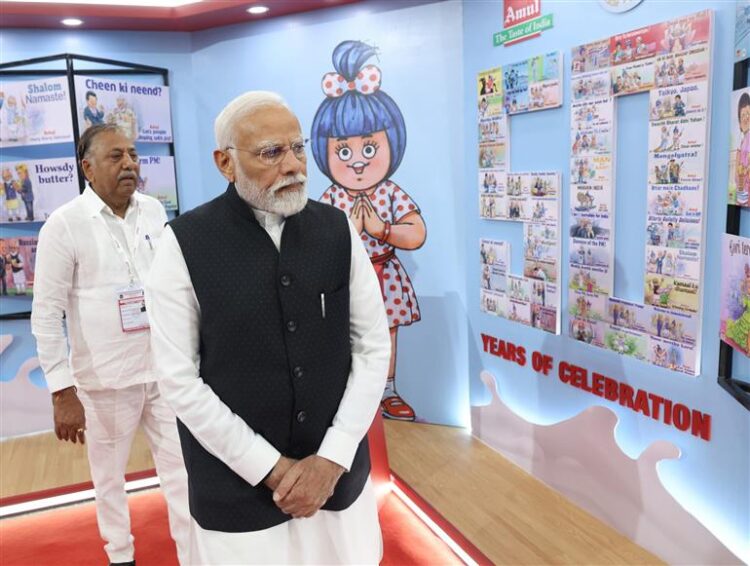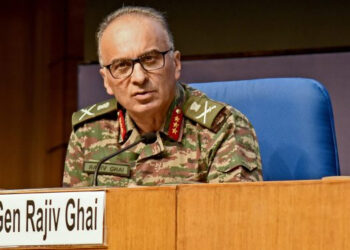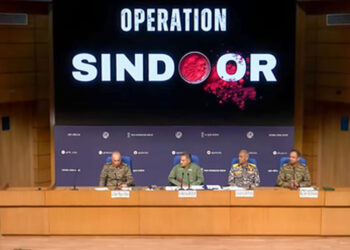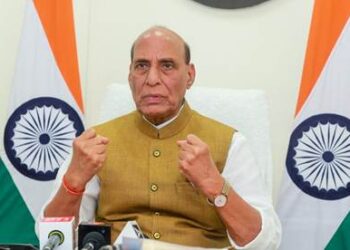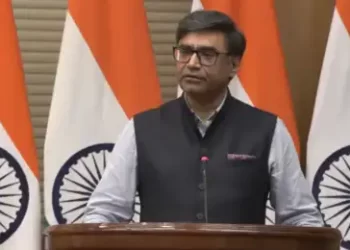The Prime Minister, Shri Narendra Modi participated in the Golden Jubilee celebration of Gujarat Cooperative Milk Marketing Federation (GCMMF) at Narendra Modi Stadium in Motera, Ahmedabad today. The Prime Minister took a walkthrough of the exhibition showcased on the occasion and also unveiled the Golden Jubilee Coffee Table Book. GCMMF is a testimony of the resilience of cooperatives, their entrepreneurial spirit and the strong determination of farmers, which has made Amul one of the strongest dairy brands in the world.
Addressing the gathering, the Prime Minister congratulated everyone for the Golden Jubilee celebration of Gujarat Cooperative Milk Marketing Federation (GCMMF) and said that a sapling that was planted 50 years ago by the farmers of Gujarat has become a giant tree with branches all over the world. He did not forget to acknowledge the contribution of ‘Pashu Dhan’ the animals in the white revolution.
The Prime Minister underlined that even though several brands emerged in India after independence, there were none like Amul. “Amul has become the symbol of the strength of the Pashupalaks of India”, the Prime Minister said, “Amul means trust, development, public participation, empowerment of farmers and the technological advancements through time.” Shri Modi remarked that Amul is the inspiration of Atmanirbhar Bharat. Noting that Amul products are exported to more than 50 countries around the world, the Prime Minister highlighted the organization’s achievements and mentioned more than 18,000 milk cooperative committees, a network of 36,000 farmers, processing of more than 3.5 crore litres of milk per day, and online payments to livestock breeders worth more than Rs 200 crores. Shri Modi emphasized that the momentous work being done by this organization of small livestock breeders makes for the strengths of Amul and its co-operatives.
The Prime Minister said that Amul is an example of the transformation that is brought about by decisions taken with foresight. He recalled that the origins of Amul lay in Kheda Milk Union under the guidance of Sardar Patel. With the expansion of cooperatives in Gujarat, GCMMF came into being. He said, “It is a great example of balance between cooperatives and government and such efforts have made us the largest milk-producing nation of the world, employing 8 crore people.” He informed that in the last 10 years, milk production increased by almost 60 percent and per capita milk availability has increased by about 40 percent. The Indian dairy sector, he said, is growing by 6 percent per year as compared to the global average of 2 percent.
The Prime Minister underscored the centrality of women in the Rs 10 lakh crore dairy sector. He said the turnover of the dairy sector, helmed by women upto 70 percent, is more than the turnover of wheat, rice and sugarcane combined. “This Nari Shakti is the real backbone of the dairy sector. Today, when India is moving ahead with women-led development, the success of its dairy sector is a huge inspiration”, he said. Underlining the criticality of improving the economic depth of women in the journey of Viksit Bharat, the Prime Minister mentioned Mudra Yojana 70 percent of Rs 30 lakh crore assistance has been availed by women entrepreneurs. Also, the number of women in Self Help Groups has crossed 10 crore and they have received more than 6 lakh crore worth of financial help. Most of the 4 crore PM Awas houses are in the name of the women of the house. The Prime Minister also mentioned the Namo Drone Didi Scheme where 15,000 SHGs are being given drones and members are being given training.
Prime Minister Modi expressed delight at the growing number of women in the dairy co-operative committees of Gujarat and mentioned disbursing the income from dairy directly into their bank accounts. The Prime Minister also praised the efforts of Amul and mentioned setting up micro ATMs in villages to help livestock breeders withdraw cash in the area. He also dwelled upon the schemes to provide Rupay Kisan Credit Cards to pushupalaks and informed about the pilot project underway in Panchpipla and Banaskantha.
Recalling Gandhi Ji’s words that India resides in its villages, the Prime Minister underlined the need to strengthen the rural economy. He pointed out that the previous government had a fragmented view towards the rural economy, while the present government is making progress by prioritizing every aspect of the village. “Government focuses on making the lives of small farmers easier, expanding the scope of animal husbandry, creating a healthy life for the livestock and promoting fisheries and honey-bee keeping in the villages”, the Prime Minister said, as he mentioned providing the benefit of Kisan Credit Cards to livestock breeders and fish breeders. He also touched upon providing farmers with modernized seeds that can cope with climate change. The Prime Minister also mentioned the National Gokul Mission that aims to improve the dairy cattle species. Throwing light on the government’s effort to curb the difficulties faced by the cattle due to Foot and Mouth Disease and the huge losses incurred to the cattle farmers worth thousands of crores of Rupees, the Prime Minister informed about the initiation of a free vaccination program worth Rs 15,000 crores which has carried out more than 7 crore vaccinations so far. “We are working to eradicate Foot and Mouth disease by 2030”, the Prime Minister added.
The Prime Minister also mentioned the decision related to livestock in last night’s Cabinet meeting. The Cabinet took a decision to amend the National Livestock Mission to promote indigenous species. Financial assistance will be provided to use non-arable land for fodder purposes. Insurance premiums for livestock protection have been significantly reduced.
Prime Minister underscored the critical importance of water conservation in Gujarat, stating, He recounted the hardships witnessed during the drought in Saurashtra and Kutch, where thousands of animals perished due to water scarcity. Prime Minister Modi highlighted the transformative impact of the Narmada water reaching these regions, stating, “The fate of such areas has changed after the arrival of Narmada water.” This intervention has brought about significant improvements in the lives of the people and agricultural practices in these regions. “We are striving to ensure that such challenges are not encountered in the future,” Prime Minister Modi affirmed, emphasizing the government’s proactive measures to address water scarcity and enhance rural economies nationwide. “The construction of more than 60 Amrit Sarovar reservoirs by the government has greatly benefited the rural economy of the country”, he said.
“Our endeavor is to integrate small-scale farmers in villages with modern technology,” Prime Minister Modi expressed, emphasizing the government’s commitment to empowering small farmers through technological advancements. “In Gujarat, we have witnessed a manifold increase in the scope of micro-irrigation in recent years,” he noted, highlighting the government’s efforts in promoting efficient irrigation methods such as drip irrigation. Shri Modi mentioned the establishment of lakhs of Kisan Samriddhi Kendras to provide scientific solutions to farmers near their villages. Efforts are underway to assist farmers in making organic fertilizers, with provisions being made for their production, Prime Minister Modi said.
“Our government is focused on transforming farmers into energy producers and fertilizer suppliers”, Prime Minister Modi affirmed, highlighting the multifaceted approach of the government in uplifting rural economies. In addition to providing solar pumps to farmers, assistance is being extended to install small-scale solar plants on farm premises, Prime Minister Modi elaborated, underscoring the government’s commitment to sustainable energy solutions in agriculture.
Furthermore, Prime Minister Modi announced the implementation of a scheme to purchase cow dung from livestock farmers under the Gobar Dhan Yojana, which will facilitate the production of biogas for electricity generation. “The establishment of biogas plants by Amul in Banaskantha is a significant step in this direction,” Prime Minister Modi highlighted, citing examples of successful initiatives in the dairy sector.
“Our government is significantly expanding the scope of cooperation in the rural economy”, Prime Minister Modi stated, emphasizing the government’s commitment to promoting cooperative societies as drivers of economic growth. “For the first time, a separate Ministry of Cooperation has been established at the central level,” Prime Minister Modi pointed out. “With the establishment of over two lakh cooperative societies in more than two lakh villages across the country, the cooperative movement is gaining momentum,” Prime Minister Modi remarked. In sectors such as agriculture, animal husbandry, and fisheries, these societies are being formed. “Our government is encouraging cooperative societies in manufacturing through the ‘Made in India’ initiative,” Prime Minister Modi affirmed, emphasizing the government’s support through tax incentives and funding. These cooperatives are being encouraged to be part of Made-in-India manufacturing through tax incentives. He further said that 10 thousand FPOs, out of which 8 thousand are already functional, are big organizations of small farmers and have a “mission of converting small farmers from producers to agri-entrepreneurs”, he said. He informed that PACs, FPOs and other cooperative bodies are getting assistance worth crores of rupees. He also mentioned a 1 lakh crore rupees fund for agri-infrastructure.
The Prime Minister talked about the record investment for Livestock infrastructure with a 30 thousand crore rupees fund. Dairy cooperatives are getting more rebate on interest now, he said. The government is also spending thousands of crores of rupees on the modernization of milk plants. Under this scheme, two big projects of Sabarkantha Milk Union have been inaugurated today. It also includes a modern plant producing 800 tonnes of animal fodder per day.
“I believe in Sabka Prayas when I speak of Viksit Bharat”, the Prime Minister remarked. Noting that Amul will complete 75 years when India reaches its 100th year of independence, the Prime Minister highlighted the organization’s role in fulfilling the nutritional needs of the rapidly increasing population. He expressed delight that Amul has set a target of doubling the processing capacity of its plants in the next 5 years. “Today Amul is the eighth largest dairy company in the world. You have to make it the world’s largest dairy company as soon as possible. The government stands with you in every way, and this is Modi’s guarantee”, the Prime Minister concluded, conveying his best wishes on reaching the milestone of 50 years.
Governor of Gujarat, Shri Acharya Devvrat, Chief Minister of Gujarat, Shri Bhupendra Patel, Union Minister of State for Animal Husbandry, Dairying and Fisheries of India, Shri Parshottam Rupala, and Chairman of Gujarat Cooperative Milk Marketing Federation, Shri Shamal B Patel were present on the occasion among others. More than 1.25 lakh farmers were part of the celebrations.
Source:PIB








 Finance
Finance